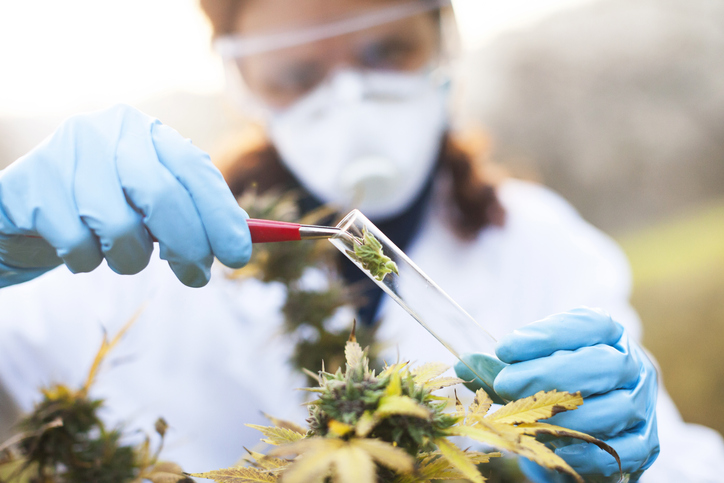Let's talk about lab water
Let's talk about lab water

Medical cannabis has been shown to be effective in providing relief for various diseases, such as multiple sclerosis, that have not been successfully treated with other registered drugs currently available. As a result, many countries have recently legalised medical cannabis or introduced pilot programmes to evaluate the risks and benefits of legalisation for medical purposes. However, the dose required is highly individual, and treatment needs to be closely supervised to avoid undesired side effects, feeling ‘high’ or dependency resulting from long-term use. In addition, the patient’s cannabis consumption needs to be monitored and the minimum effective dose given, to avoid abuse or non-medical use, particularly as cannabis is still a registered class A drug in some parts of the world. Mass customisation is a suggested manufacturing model that integrates critical patient information, such as treatment dose, into mass production pipelines, to produce highly personalised drug products. Individual patterns of quick-response (QR) codes can be printed onto products to allow the production of pharmaceuticals with information-rich labelling.
Cannabis Sativa contains hundreds of cannabinoids, two of which – psychoactive delta-9-tetrahydrocannabinol (THC) and non-psychoactive cannabidiol (CBD) – are important active ingredients in the medical cannabis that are now synthetically manufactured. The cannabis extracts have low water solubility so are only available as oil- or ethanol-based formulations, rather than traditional tablets or capsules. Researchers at the Åbo Akademi University, Finland, and the University of Copenhagen, Denmark, have developed edible pharmaceutical products that contain active cannabinoids, using inkjet printing for the personalisation of each dose.
The recent study1 developed data-enriched edible pharmaceuticals (DEEP) with different doses of two cannabinoids, THC and CBD. A cannabinoid-containing ink was imprinted onto freeze-dried porous foams in increasing layers (1-10) using a standard desktop inkjet printer, to incorporate different doses of the lipophilic compounds. The imprint was in the pattern of a personalised QR code to provide relevant patient data and allow for the traceability of the drug at a single dose unit level using a standard smart phone.
The THC and CBD content in the DEEP prior to consumption and during in vitro drug release in saliva samples at 37 °C was analysed using ultra-performance liquid chromatography (UPLC). The analyte solutions were prepared by dissolving the DEEP in 3 ml of acetonitrile and Type I ultrapure water from an ELGA LabWater PURELAB® flex 4. Ultrapure water was also used in the preparation of the polymer substrate.
Analysis of the THC and CBD content in the DEEP revealed a strong correlation between the number of printed layers of ink and the concentration of cannabinoids deposited. THC and CBD were successfully imprinted onto the substrate with an average of 0.051 and 0.054 mg per printed layer, respectively. Comparisons between the measured and label-specified quantities demonstrated that the cannabis ink was not affected by the printing process or the UPLC analysis. For DEEP printed with 3-5 layers, the concentration of CBD was still 94 % of the initial concentration after storing in cold and dry conditions for 8 weeks, demonstrating only minor degradation.
The printed DEEP is suitable for oral administration on or below the tongue as the porous structure allows for the rapid wetting of the substrate. The 10-layer DEEP was found to be an immediate-release formulation; 80 % of the THC and CBD were released in 45 minutes, which is comparable to the marketed drug product Sativex®. All printed substrates could resist handling without breakage to fulfil the requirements of the European Pharmacopeia, and imprinting increased the stiffness and rigidity of the DEEP.
The legalisation of cannabis for medical purposes could be effective in treating various diseases, however, doses need to be personalised and monitored to avoid unwanted side effects or drug misuse. Inkjet printing of cannabis-containing ink in the pattern of a QR code can be an effective method for administering personalised doses while including critical patient information and tracking every dose of medical cannabis. This study also highlights the importance of using the correct storage conditions for medical cannabis products to prevent the degradation of light and temperature sensitive cannabinoids. The protocols used in this research will be effective for quantifying the drug content in edible pharmaceuticals, and evaluating the accuracy of methods for administering personalised doses of medical cannabis.
The presence of impurities in laboratory water can be a major problem in research experiments, and can seriously compromise results. ELGA LabWater has been a trusted name in pure and ultrapure water since 1937. We believe in providing you with water purification solutions that can meet a wide range of needs and applications, supported by excellent service and support. For more information on our Type I ultrapure water systems, check out our PURELAB Quest, PURELAB Chorus 1 Complete and our PURELAB Flex models.
Reference:
1. Öblom et al., 2020, 'Data-enriched edible pharmaceuticals (DEEP) of medical cannabis by inkjet printing', International Journal of Pharmaceuticals, 589:119866